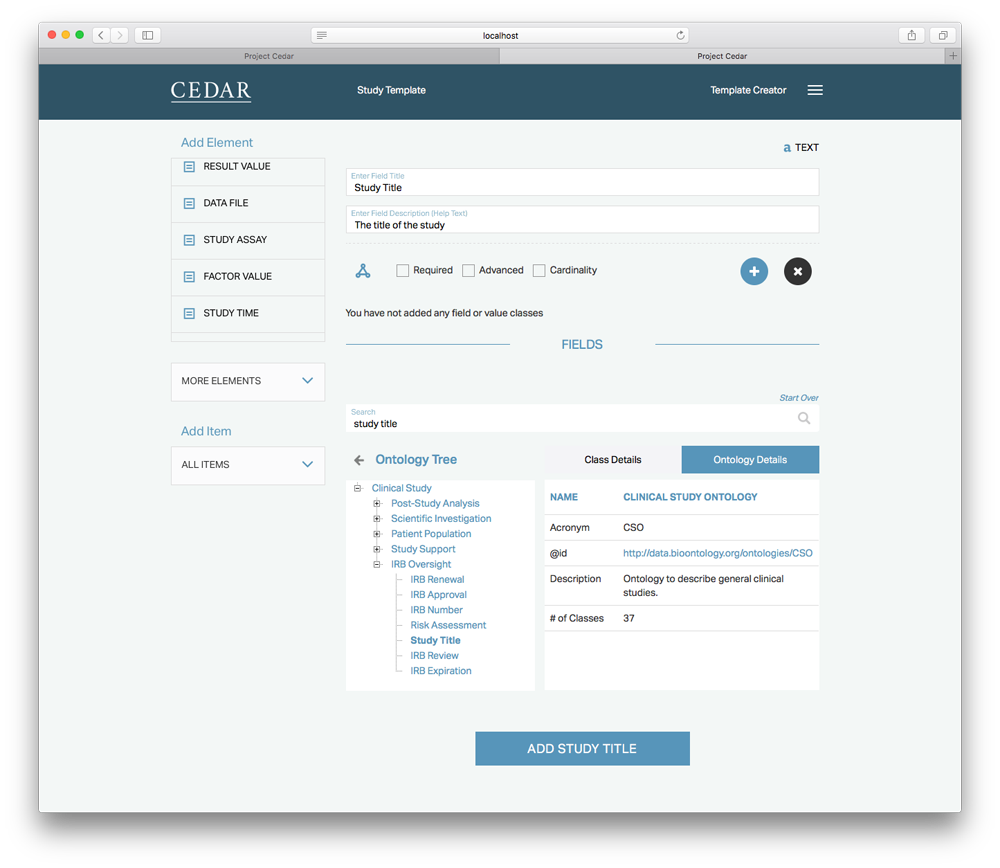At CEDAR, we focus on simplifying the process of authoring metadata. We are building a computational infrastructure to develop and use metadata templates for describing laboratory studies. Metadata templates specify the fields that scientists must fill in for every type of study, how the different fields of the template relate to one another, allowed value sets for the fields, and so on.
Our technology will allow community-based organizations to collaborate to create structured metadata templates; investigators to populate the templates with metadata from their experiments; and other scientists to search the metadata to access and analyze the corresponding online information.
One of the core components enabling these activities is the CEDAR Metadata Template Editor, which is a Web-based tool designed to simplify as much as possible the authoring, search and population of metadata templates.
Template and Field Authoring
 Our Metadata Template Editor facilitates specifying the fields for the templates, the constraints on the values for each field, and the links and dependencies among the different templates for particular studies.
Our Metadata Template Editor facilitates specifying the fields for the templates, the constraints on the values for each field, and the links and dependencies among the different templates for particular studies.
Template editing can start with the creation of a single field. For each field, a template creator can provide the recommended name, type, description, link to one or more semantic concepts, and constraints on the accepted values. The template creator can save this field for later re-use by any other template creator, who simply selects the desired field from a list.
When defining metadata templates, groups of fields are often used together (e.g., the list of fields that describe a scientific publication: title, authors, publication year, and so on). Our tool makes it possible to define sets of fields, store them as a group, and make them available to the community. Other template creators can reuse these basic building blocks later, either in combination with other groups of previously-created fields or with individual newly created fields. In this way the template creator assembles complex templates, which will also be shared with the community and used to compile metadata from multiple sources using a common format and structure.
Importantly, our technology simplifies the process of finding the most appropriate ontology terms to describe the templates, their fields, and the value sets accepted by each field. In this way both the templates and the metadata collected using them are enriched with widely accepted ontology terms. Our technology interacts with the BioPortal API to retrieve all ontology terms relevant for a particular metadata template or field, as well as standard definitions of all the possible values accepted by each field.
CEDAR’s technology enables template authors not only to find terms in ontologies, but also to specify new terms and even new ontologies. In existing ontologies, CEDAR even allows template creators and metadata authors to ask the ontology owners to create new terms.
Template Search
Metadata Templates created using CEDAR technology are stored in our community repository. Researchers can access our library to look for appropriate templates to annotate their studies. Templates that have been shared publicly, or shared with the specific researcher, can be discovered and used to fill out metadata instances. They can also be used as a basis for implementing template extensions and enhancements.
Users can search or browse the CEDAR metadata repository either using our Web-based interfaces or our APIs, which enable programmatic access to all metadata templates defined using CEDAR technology, as well as all the metadata collected using those templates.
At first, template searches will be relatively simple text-based searches. As the repository grows over time, we will add facets, semantics, and rankings to enable more sophisticated searches.
Template Applications
Once created, the CEDAR metadata templates are applied throughout the CEDAR framework. The CEDAR Metadata Tools let users create, annotate, analyze, validate, and search metadata based on the fields and relations defined in the metadata templates.

